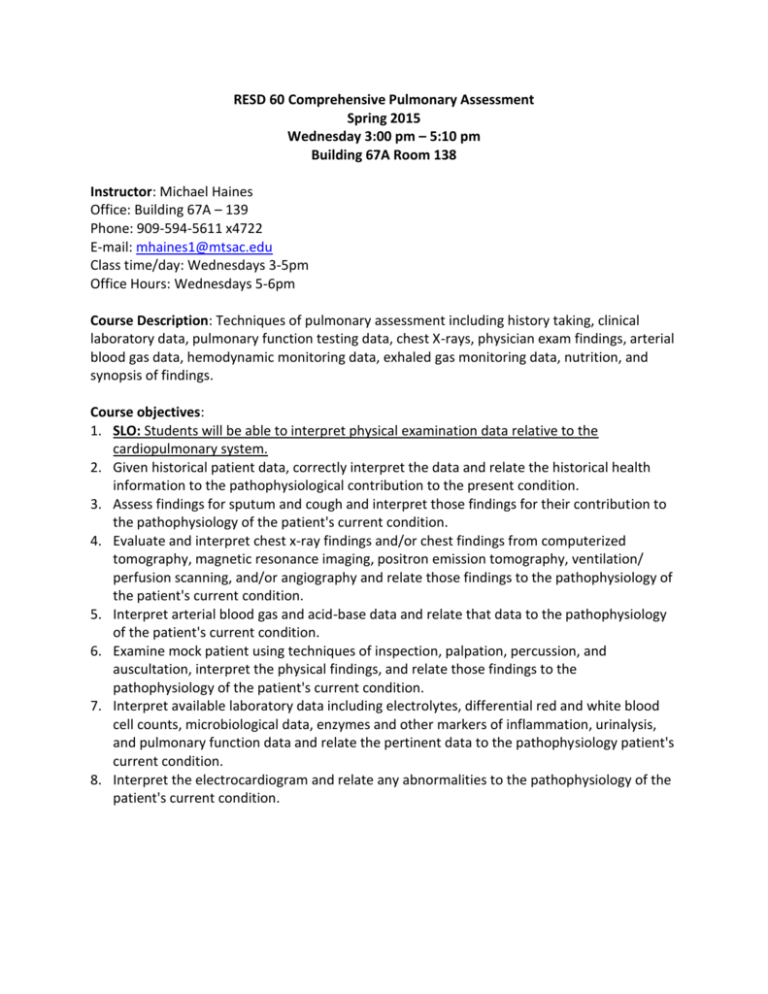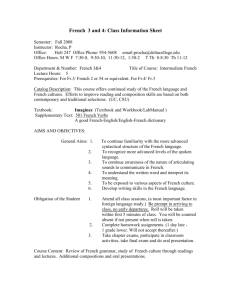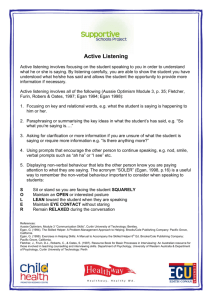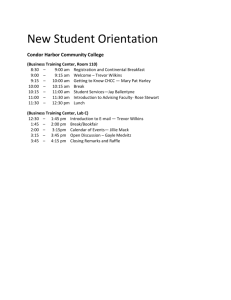File - Respiratory Therapy Files
advertisement

RESD 60 Comprehensive Pulmonary Assessment Spring 2015 Wednesday 3:00 pm – 5:10 pm Building 67A Room 138 Instructor: Michael Haines Office: Building 67A – 139 Phone: 909-594-5611 x4722 E-mail: mhaines1@mtsac.edu Class time/day: Wednesdays 3-5pm Office Hours: Wednesdays 5-6pm Course Description: Techniques of pulmonary assessment including history taking, clinical laboratory data, pulmonary function testing data, chest X-rays, physician exam findings, arterial blood gas data, hemodynamic monitoring data, exhaled gas monitoring data, nutrition, and synopsis of findings. Course objectives: 1. SLO: Students will be able to interpret physical examination data relative to the cardiopulmonary system. 2. Given historical patient data, correctly interpret the data and relate the historical health information to the pathophysiological contribution to the present condition. 3. Assess findings for sputum and cough and interpret those findings for their contribution to the pathophysiology of the patient's current condition. 4. Evaluate and interpret chest x-ray findings and/or chest findings from computerized tomography, magnetic resonance imaging, positron emission tomography, ventilation/ perfusion scanning, and/or angiography and relate those findings to the pathophysiology of the patient's current condition. 5. Interpret arterial blood gas and acid-base data and relate that data to the pathophysiology of the patient's current condition. 6. Examine mock patient using techniques of inspection, palpation, percussion, and auscultation, interpret the physical findings, and relate those findings to the pathophysiology of the patient's current condition. 7. Interpret available laboratory data including electrolytes, differential red and white blood cell counts, microbiological data, enzymes and other markers of inflammation, urinalysis, and pulmonary function data and relate the pertinent data to the pathophysiology patient's current condition. 8. Interpret the electrocardiogram and relate any abnormalities to the pathophysiology of the patient's current condition. Learning Objectives Learning objectives specific to each topic will be given each week. These objectives will break down the course objectives into specific elements. These objectives are to guide your study for exams and guide your text book reading. Text book reading is a key element to success in this course and in the Respiratory Therapy Program. Learning objectives will be assigned that are not covered in the lecture or handouts. The correct answer to some objectives can only be found in the text books. Required texts: 1. Wilkins, Dexter, Heuer. Clinical Assessment in Respiratory Care, 6th Ed. Elsevier 2010. ISBN 978-1-4160-5923-3. 2. Des Jardins, Burton. Clinical Manifestations and Assessment of Respiratory Disease, 6th Ed. Elsevier 2011. ISBN 978-0-323-05727-1. 3. Kacmarek, Stoller, and Heuer. Egan’s Fundamentals of Respiratory Care, 10th Ed. Elsevier 2013. ISBN 978-0-323-08203-7. 4. Butler. Laboratory Exercises for Competency in Respiratory Care, 2nd Ed. F.A. Davis 2009. ISBN 978-0-8036-1378-2. 5. Wherman. Egan’s Fundamentals of Respiratory Care Workbook, 10th Ed. Elsevier 2013. ISBN 978-0-323-08202-0. Grading Percentages Homework Exams Final exam 10% 50% 40% * * All homework assignments must be completed and turned in or a grade of incomplete will be issued. A grade of incomplete in this course does not allow a student to progress to the next semester in the program. For all chapters assigned from the Egan text, the WB chapters are to be completed and filed in binder for instructor review throughout the semester. Grading Scale 90-100% 80-89% 70-79% A B C This is a core curriculum course. A grade of less than C will be considered a failing grade. Revised Course Schedule RESD 60 – Cardiopulmonary Assessment* Date 2/25 Topic Cardiopulmonary Symptoms 3/4 Vital Signs Fundamentals of the Physical Exam 3/11 Exam 1 Clinical Laboratory Studies 3/20 Clinical Laboratory Studies cont. 3/25 QUIZ 1 Interpretation of Blood Gases 4/1 Pulmonary Function Testing 4/8 Exam 2 Neurologic Assessment 4/15 Clinical Application of the Chest Radiograph 4/22 Quiz 2 Analysis and Monitoring of Gas Exchange Exam 3 – In Class Assignment Interpretation of Electrocardiogram Tracings 4/29 5/6 5/13 Quiz 3 Interpretation of Electrocardiogram Tracings 5/20 Exam 4 – Assessment of Older Patients 5/27 Assessment of Gas Exchange and Transport Reading Egan Chapter 15 Wilkins Chapter 3 Des Jardins Chapter 2 HW: Complete workbook for Ch. 15 Egans Wilkins Chapter 4 Butler Chapter 6 Egan Chapter 16 Wilkins Chapter 7 Des Jardins Chapter 8 HW: Complete workbook for Ch. 16 Egans Egan Chapter 13 Des Jardins Ch 4 & 5 Wilkins Chapter 8 Butler Chapter 28 HW: Complete workbook for Ch. 13 Egans Des Jardins Chapter 3 Butler Chapter 31 Wilkins Chapter 9 Egan Chapter 19 HW: Complete workbook for Ch. 19 Egans Wilkins Chapter 6 Egan Chapter 20 Butler Chapter 33 Wilkins Chapter 10 Des Jardins Chapter 7 HW: Complete workbook for Ch. 20 Egans Egan Chapter 18 HW: Complete workbook for Ch. 18 Egans Egan Chapter 17 Wilkins Chapter 11 Butler Chapter 35 Des Jardins Chapter 6 HW: Complete workbook for Ch. 17 Egans Egan Chapter 17 Wilkins Chapter 11 Butler Chapter 35 Des Jardins Chapter 6 Butler Chapter 35 Des Jardins Chapter 6 Egan Chapter 11 HW: Complete workbook for Ch. 11 Egans 6/3 6/10 CSRC Conference (Take home assignment) Final Exam *The schedule is a guide for the student and may be modified by the instructor as necessary during the semester. The student is responsible for any and all modifications in this syllabus that are announced in class RESD Course Policies Attendance: Success in college depends on regular class attendance. Students are expected to attend each class session and arrive on time. Students are required to notify the instructor if they will be late or absent from class. It is not acceptable to have another student notify the instructor for you. If you miss a class, it is your responsibility to obtain any handouts or assignments, and find out about any changes in the course schedule, assignments, homework, etc. that are announced in class. Class time missed due to arriving late or leaving early will accumulate, two such occurrences will equal one absence. Students are allowed two absences and will be dropped from the course upon their third full or partial absence. The last day to drop this course without a “W” appearing on your transcript is March 11. The last day to drop with a “W” appearing on your transcript is May 3. If greater than two absences are accumulated after that date, a letter grade of F will be given on the final grade report. It is the student’s responsibility to keep track of accumulated time and absences. It is the responsibility of the student to officially drop the course if the choice is made to no longer attend. Assignments: Assignments will be announced throughout the semester and will be based on class discussions and reading assignments. Assignments may include homework, in class assignments, projects, clinical simulations, written reports or presentations. Assigned homework is due at the beginning of the class period. Homework received after that time will be considered late. Late homework is not accepted. Work that is not legible, poorly written, or shows little effort will be returned with a grade of zero. The student is responsible for all homework assigned and due in the event of an absence or tardy. Class Participation: Students are expected to actively participate in class. Exams and Quizzes: No make-up or rescheduled examinations or quizzes will be permitted unless there are extenuating circumstances and approved by the instructor before the date of the scheduled examination. Additional Policies: 1. Check your Mt. SAC e-mail account on a regular basis as this will be the primary form of communication for the course. 2. No food in the classroom. Drinks allowed at the discretion of each instructor 3. Tape recording is not allowed. 4. Cellular phones and other electronic devices must be turned off or silent during class and may not be used in the classroom or laboratory at any time. This includes breaks, before, and after class. 5. Calculators are not allowed during quizzes and exams. 6. The class syllabus is a guide for the student and may be modified by the instructor as necessary during the semester. The student is responsible for any and all modifications in this syllabus that are announced in class. If a student does not adhere to these policies the student will be asked to leave the classroom for the remainder of the class period and must arrange a meeting with the instructor prior to the next class meeting. Signature Page I, ______________________________, have read the RESD 60 Syllabus. I understand and will abide by all of the information and policies included in this syllabus. I have had the opportunity to ask questions and have had all of my questions answered. I also understand the consequences of not adhering to the information and policies included in the syllabus. ______________________________ Signature ______________________________ Date



